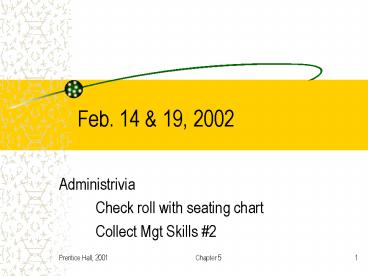Feb' 14 - PowerPoint PPT Presentation
1 / 30
Title:
Feb' 14
Description:
Ask student to give examples of things that they think affect ... Perception Point - Counterpoint. Sell your company. Realistic job preview. What would you do? ... – PowerPoint PPT presentation
Number of Views:23
Avg rating:3.0/5.0
Title: Feb' 14
1
Feb. 14 19, 2002
- Administrivia
- Check roll with seating chart
- Collect Mgt Skills 2
2
Ch. 5 Perception and Individual Decision Making
3
Key Concepts
- Perception
- Attribution
- Perceptual biases
- Decision-making models
- Ethical dilemmas
4
Factors ThatInfluence Perception
5
Perceiver Factors
- Attitudes (recall chapter 3)
- Interests
- Experience
- Expectations
- Physical ability (not in book take off glasses)
- Unsatisfied needs (motives, well see in ch. 6)
Ask student to give examples of things that they
think affect their perception. What do they
notice around the Unistructure?
6
Target Factors
- Novelty
- Motion (walk around class room)
- Sounds (whisper)
- Size (write on board very small, very large)
- Background
- Proximity
- Similarity (guys with hats all look alike!)
7
Situation Factors
- General context (e.g., work vs. social)
- Noise or other distractions
- Lighting (never forget the obvious!)
8
Perception ? Attribution
- Attribution refers to our tendency to assign a
cause to behaviors - There are only two types of basic attributions
- Internal it was something about the person that
led to this behavior - External it was something about the situation
that led to this behavior
9
(No Transcript)
10
Attribution Biases
- Fundamental attribution error
- Self-serving bias
- Beware of cultural differences in frequency of
these biases! (Hofstede individualism v.
collectivism, particularly for fundamental
attribution error)
11
Perceptual Shortcuts (Biases)
12
Applications in organizations
- Selection
- Evaluation
- Assignments
- Rewards
The self-fulfilling prophecy problem
13
Tuesday, Feb. 19, 2002
- Administrivia
- Exam next class, Ch. 1, 3, 4, 5
- Bring a pencil for scantron portion
14
Key Concepts
- Perception
- Attribution
- Perceptual biases
- Decision-making models
- Ethical dilemmas
15
Perception Decision Making
Awareness and Recognition of Problems
Interpretation and Evaluation of Information
16
Decision making models
- Rational
- Bounded rationality
- Intuition
- Political
17
Rational Model of Decision Making
18
Assumptions of the Rational Decision Making Model
One Problem Clarity
Four Constant Preferences
Five No Constraints
Two Known Options
Three Clear Preferences
Six Maximum Payoff
19
A Model of Bounded Rationality
Ascertain the Need for a Decision
Select a Few Criteria
Identify a Limited Set of Alternatives
Compare Alternatives Against Criteria
Select the First Good Enough Choice
Yes
Simplify the Problem
Expand Search for Alternatives
A Satisficing Alternative Exists
No
20
Intuitive decision making
- High uncertainty levels
- Little precedent
- Hard to predictable variables
- Limited facts
- Unclear sense of direction
- Analytical data is of little use
- Several plausible alternatives
- Time constraints
21
Political model of decision making
- Context
- Self-interest
Recall Machiavellianism personality trait
22
Two Important Decision-Making Phases
23
Making Choices in the Workplace
Availability Heuristic
Representative Heuristic
Escalation of Commitment
24
Skip if needed
Decision-Making Styles
High
Analytic
Conceptual
Tolerance for Ambiguity
Behavioral
Directive
Low
Way of Thinking
Rational
Intuitive
25
Organizational Constraints
26
(No Transcript)
27
Ethics in Decision-Making
Utilitarian (Ego, Rule, Act)
Rights
Justice
28
Ethical Dilemma, p. 150
- Pay a bribe?
- Steal from company?
- Falsify your expense account?
- Falsify your identity?
- Your friend is a thief?
29
Perception Point - Counterpoint
- Sell your company
- Realistic job preview
What would you do? Ethical implications?
30
Skilled Decision Making
- Analyze the context and the problem
- Match decision making style to situation
- Dont focus only on the obvious
- Be alert to potential biases














![Funding and acquisitions in Indian startups this week [12 – 17 Feb] PowerPoint PPT Presentation](https://s3.amazonaws.com/images.powershow.com/10001240.th0.jpg?_=20240220015)
















